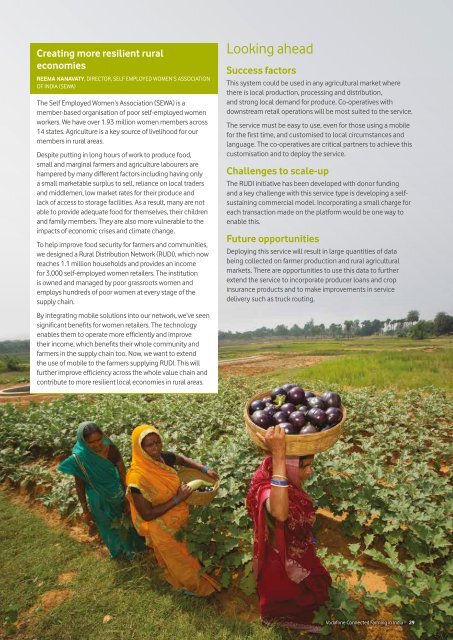Connected-Farmers
Connected-Farmers
Connected-Farmers
You also want an ePaper? Increase the reach of your titles
YUMPU automatically turns print PDFs into web optimized ePapers that Google loves.
Creating more resilient rural<br />
economies<br />
REEMA NANAVATY, DIRECTOR, SELF EMPLOYED WOMEN’S ASSOCIATION<br />
OF INDIA (SEWA)<br />
The Self Employed Women’s Association (SEWA) is a<br />
member-based organisation of poor self-employed women<br />
workers. We have over 1.93 million women members across<br />
14 states. Agriculture is a key source of livelihood for our<br />
members in rural areas.<br />
Despite putting in long hours of work to produce food,<br />
small and marginal farmers and agriculture labourers are<br />
hampered by many different factors including having only<br />
a small marketable surplus to sell, reliance on local traders<br />
and middlemen, low market rates for their produce and<br />
lack of access to storage facilities. As a result, many are not<br />
able to provide adequate food for themselves, their children<br />
and family members. They are also more vulnerable to the<br />
impacts of economic crises and climate change.<br />
To help improve food security for farmers and communities,<br />
we designed a Rural Distribution Network (RUDI), which now<br />
reaches 1.1 million households and provides an income<br />
for 3,000 self-employed women retailers. The institution<br />
is owned and managed by poor grassroots women and<br />
employs hundreds of poor women at every stage of the<br />
supply chain.<br />
Looking ahead<br />
Success factors<br />
This system could be used in any agricultural market where<br />
there is local production, processing and distribution,<br />
and strong local demand for produce. Co-operatives with<br />
downstream retail operations will be most suited to the service.<br />
The service must be easy to use, even for those using a mobile<br />
for the first time, and customised to local circumstances and<br />
language. The co-operatives are critical partners to achieve this<br />
customisation and to deploy the service.<br />
Challenges to scale-up<br />
The RUDI initiative has been developed with donor funding<br />
and a key challenge with this service type is developing a selfsustaining<br />
commercial model. Incorporating a small charge for<br />
each transaction made on the platform would be one way to<br />
enable this.<br />
Future opportunities<br />
Deploying this service will result in large quantities of data<br />
being collected on farmer production and rural agricultural<br />
markets. There are opportunities to use this data to further<br />
extend the service to incorporate producer loans and crop<br />
insurance products and to make improvements in service<br />
delivery such as truck routing.<br />
By integrating mobile solutions into our network, we’ve seen<br />
significant benefits for women retailers. The technology<br />
enables them to operate more efficiently and improve<br />
their income, which benefits their whole community and<br />
farmers in the supply chain too. Now, we want to extend<br />
the use of mobile to the farmers supplying RUDI. This will<br />
further improve efficiency across the whole value chain and<br />
contribute to more resilient local economies in rural areas.<br />
Vodafone <strong>Connected</strong> Farming in India 29


